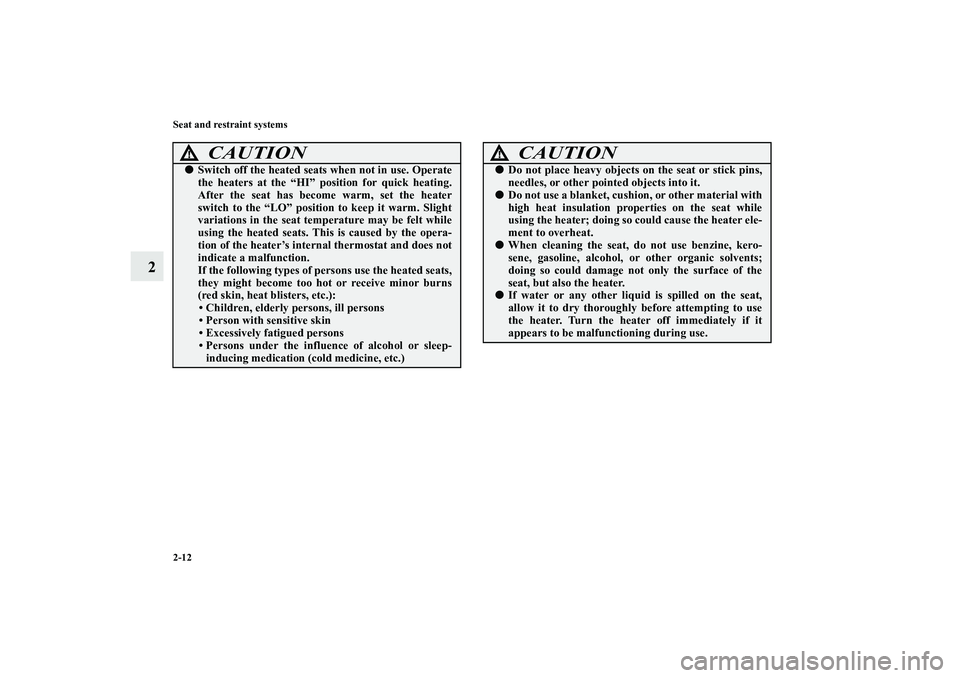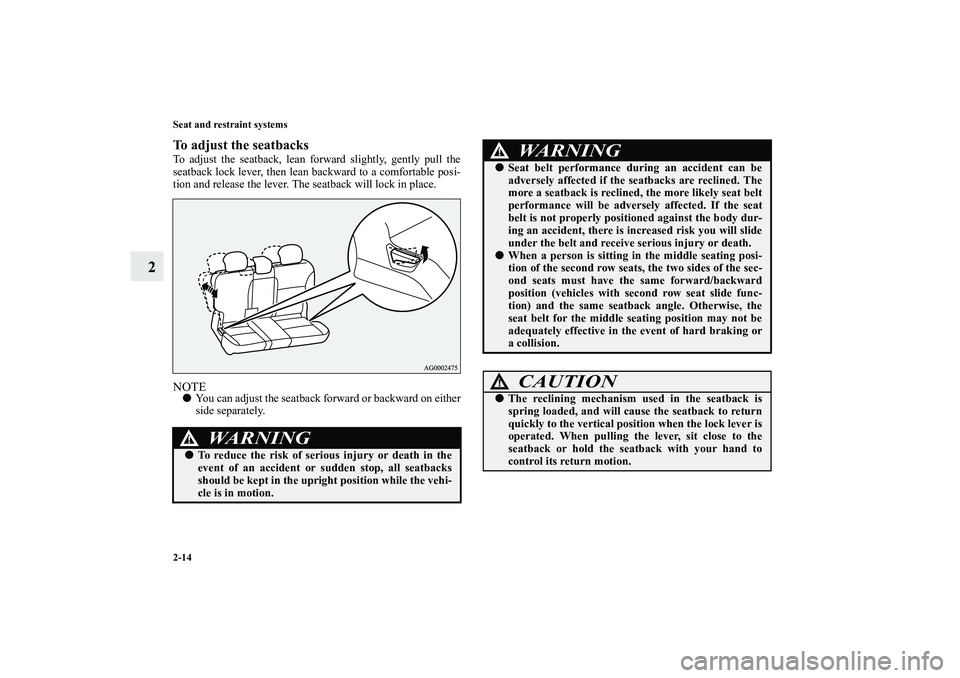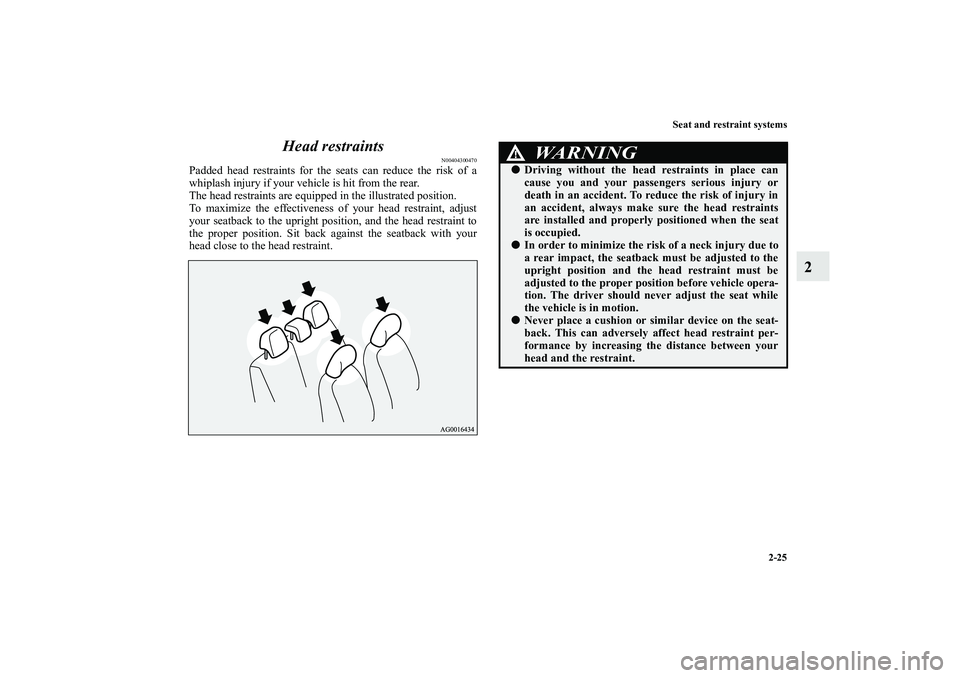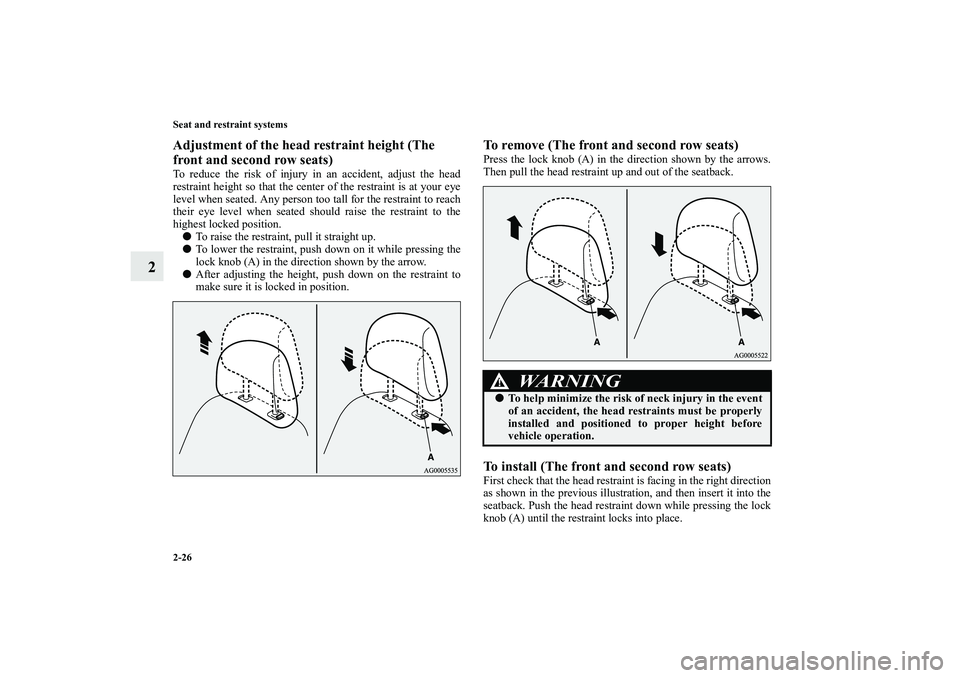Page 36 of 714
Seat and restraint systems
2-11
2
Arm rest
(if so equipped)
N00402300069
The lid on the floor console box can be moved forward and
backward and used as an arm rest.
Heated seat (if so equipped)
N00435600264
The heated seats can be operated by pushing the switch when
the ignition switch is in the “ON” position. The indicator light
(A) will illuminate while the heater is on.1 (HI) - Heater high (for quick heating)
2 - Heater off
3 (LO) - Heater low (to keep the seat warm)
BK0115300US.book 11 ページ 2009年7月16日 木曜日 午前9時13分
Page 37 of 714

2-12 Seat and restraint systems
2
CAUTION
!�
Switch off the heated seats when not in use. Operate
the heaters at the “HI” position for quick heating.
After the seat has become warm, set the heater
switch to the “LO” position to keep it warm. Slight
variations in the seat temperature may be felt while
using the heated seats. This is caused by the opera-
tion of the heater’s internal thermostat and does not
indicate a malfunction.
If the following types of persons use the heated seats,
they might become too hot or receive minor burns
(red skin, heat blisters, etc.): Children, elderly persons, ill persons
Person with sensitive skin
Excessively fatigued persons
Persons under the influence of alcohol or sleep-
inducing medication (cold medicine, etc.)
CAUTION
!�
Do not place heavy objects on the seat or stick pins,
needles, or other pointed objects into it.
�
Do not use a blanket, cushion, or other material with
high heat insulation properties on the seat while
using the heater; doing so could cause the heater ele-
ment to overheat.
�
When cleaning the seat, do not use benzine, kero-
sene, gasoline, alcohol, or other organic solvents;
doing so could damage not only the surface of the
seat, but also the heater.
�
If water or any other liquid is spilled on the seat,
allow it to dry thoroughly before attempting to use
the heater. Turn the heater off immediately if it
appears to be malfunctioning during use.
BK0115300US.book 12 ページ 2009年7月16日 木曜日 午前9時13分
Page 38 of 714
Seat and restraint systems
2-13
2 Second row seats (60/40 split fold/tumble
seats)
N00402500188
When sitting in the second row seat, adjust the head restraints
to heights at which they lock in position. Refer to “Head
restraints” on page 2-25. To adjust the seat forward or backward (vehicles
with second row seat slide function)Pull the seat adjusting lever and gently rock the seat forward or
backward to the desired position. Release the adjusting lever to
lock the seat in place.NOTE�
You can adjust the seat forward or backward on either side
separately.
WA R N I N G
!�
To make sure that the seat is securely locked, try to
move it forward or backward without using the
adjusting lever.CAUTION
!�
When sliding (vehicles with second row seat slide
function) or reclining the seat rearward, pay careful
attention to the third row seat passengers.
BK0115300US.book 13 ページ 2009年7月16日 木曜日 午前9時13分
Page 39 of 714

2-14 Seat and restraint systems
2
To adjust the seatbacksTo adjust the seatback, lean forward slightly, gently pull the
seatback lock lever, then lean backward to a comfortable posi-
tion and release the lever. The seatback will lock in place.NOTE�
You can adjust the seatback forward or backward on either
side separately.
WA R N I N G
!�
To reduce the risk of serious injury or death in the
event of an accident or sudden stop, all seatbacks
should be kept in the upright position while the vehi-
cle is in motion.
�
Seat belt performance during an accident can be
adversely affected if the seatbacks are reclined. The
more a seatback is reclined, the more likely seat belt
performance will be adversely affected. If the seat
belt is not properly positioned against the body dur-
ing an accident, there is increased risk you will slide
under the belt and receive serious injury or death.
�
When a person is sitting in the middle seating posi-
tion of the second row seats, the two sides of the sec-
ond seats must have the same forward/backward
position (vehicles with second row seat slide func-
tion) and the same seatback angle. Otherwise, the
seat belt for the middle seating position may not be
adequately effective in the event of hard braking or
a collision.CAUTION
!�
The reclining mechanism used in the seatback is
spring loaded, and will cause the seatback to return
quickly to the vertical position when the lock lever is
operated. When pulling the lever, sit close to the
seatback or hold the seatback with your hand to
control its return motion.WA R N I N G
!
BK0115300US.book 14 ページ 2009年7月16日 木曜日 午前9時13分
Page 40 of 714
Seat and restraint systems
2-15
2
Arm rest
N00403000236
Tilt the arm rest down for use as shown.
The arm rest includes a cup holder.NOTE�
Never sit on an arm rest.
Doing so could damage the arm rest.
Accessing the underfloor-stowable compact 3rd
row seat (Seating 7 passengers)
N00400100021
Access to the third row seat is possible by folding the second
row seat out of the way. Refer to “Folding the second row
seats” on page 2-29.
BK0115300US.book 15 ページ 2009年7月16日 木曜日 午前9時13分
Page 41 of 714

2-16 Seat and restraint systems
2Third row seat (Seating 7 passengers)
N00419500047
The third row seat can be used for two additional passengers.
When the third row seat is not in use, it can be stowed under
the floor to provide more cargo area.
When using the third row seat, be sure the head restraint is
properly positioned. Refer to page 2-20.
WA R N I N G
!�
The third row seats are intended for use by no more
than two belted occupants, each of which does not
exceed 160 cm (63 inches) in height.
Exceeding these limitations can result in an
increased risk of personal injury or death in the
event of an accident.
�
The third row seats are not intended for use by
infants and small children who must use rear facing
or forward facing child safety seats.
�
Third row seat operation should always be made
before driving. Operating the seat while driving
could cause the seat to move more than necessary
and result in a serious injury or death.
�
Before using, check that the third row seat is firmly
secured. If not secured, the third row seat could
move and cause a serious injury or death in an acci-
dent.
�
The third row seat should not be used when the sec-
ond row seats are folded forward. Third row seat
passengers can suffer a serious or fatal injury if the
second row seats fell backward in a collision or when
heavy breaking is applied.
�
For vehicles equipped with the cargo area cover,
when the third row seat is in use, always remove the
cargo area cover to avoid serious injury or death in
the event of an accident.
Refer to “Cargo area cover”, page 3-291.CAUTION
!�
The third row seat should be adjusted only by an
adult. If it is adjusted by a child, an unexpected acci-
dent might occur.
�
When adjusting the third row seat, keep your hands
and feet away from moving parts and the space
below the seat.
�
Be careful not to touch the exhaust pipe, because it
will remain hot for some time after the engine is
stopped.WA R N I N G
!
BK0115300US.book 16 ページ 2009年7月16日 木曜日 午前9時13分
Page 50 of 714

Seat and restraint systems
2-25
2 Head restraints
N00404300470
Padded head restraints for the seats can reduce the risk of a
whiplash injury if your vehicle is hit from the rear.
The head restraints are equipped in the illustrated position.
To maximize the effectiveness of your head restraint, adjust
your seatback to the upright position, and the head restraint to
the proper position. Sit back against the seatback with your
head close to the head restraint.
WA R N I N G
!�
Driving without the head restraints in place can
cause you and your passengers serious injury or
death in an accident. To reduce the risk of injury in
an accident, always make sure the head restraints
are installed and properly positioned when the seat
is occupied.
�
In order to minimize the risk of a neck injury due to
a rear impact, the seatback must be adjusted to the
upright position and the head restraint must be
adjusted to the proper position before vehicle opera-
tion. The driver should never adjust the seat while
the vehicle is in motion.
�
Never place a cushion or similar device on the seat-
back. This can adversely affect head restraint per-
formance by increasing the distance between your
head and the restraint.
BK0115300US.book 25 ページ 2009年7月16日 木曜日 午前9時13分
Page 51 of 714

2-26 Seat and restraint systems
2
Adjustment of the head restraint height (The
front and second row seats)To reduce the risk of injury in an accident, adjust the head
restraint height so that the center of the restraint is at your eye
level when seated. Any person too tall for the restraint to reach
their eye level when seated should raise the restraint to the
highest locked position.�
To raise the restraint, pull it straight up.
�
To lower the restraint, push down on it while pressing the
lock knob (A) in the direction shown by the arrow.
�
After adjusting the height, push down on the restraint to
make sure it is locked in position.
To remove (The front and second row seats)Press the lock knob (A) in the direction shown by the arrows.
Then pull the head restraint up and out of the seatback.To install (The front and second row seats)First check that the head restraint is facing in the right direction
as shown in the previous illustration, and then insert it into the
seatback. Push the head restraint down while pressing the lock
knob (A) until the restraint locks into place.
WA R N I N G
!�
To help minimize the risk of neck injury in the event
of an accident, the head restraints must be properly
installed and positioned to proper height before
vehicle operation.
BK0115300US.book 26 ページ 2009年7月16日 木曜日 午前9時13分